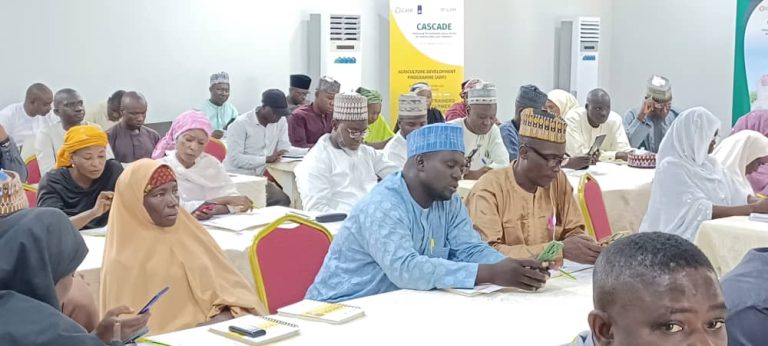By Lizzy Carr
The Catalysing Strengthened Policy Action for Healthy Diets and Resilience (CASCADE) has introduced the Farmer Field Business School (FFBS) approach to Agriculture extension workers and women in agriculture in four states of Bauchi, Jigawa, kebbi, and Nasarawa.
The new approach was launched at a four-day training for trainers on the Farmer Field Business School approach implemented by CARE with funding from the Netherlands Ministry of Foreign Affairs in Bauchi.
Senior Technical Adviser CARE USA Frantz Siede said the training is to equip the project, program, and partners with skills to effectively implement different components of the FFBS tool kit.
Other objectives are to support participants in developing a process using the cropping cycle to implement FFBS with savings and producer groups, livestock, and other types of value chain groups as well as enable them to adapt the approach for nutrition outcomes through livelihood programming.
“Today we are introducing an updated approach away from agriculture extension to now include humanly centered that include gender, nutrition and monitoring and evaluation”.
Siede said the Monitoring and evaluation facilitation techniques will ensure that will ensure that when passing down knowledge and skills acquired it takes care of building capacity and empowerment.
“It is not just about crop yield productivity it involves gender and women participation in markets, value chain, and nutrition.”
Policy Advocacy Specialist CASCADE Netherlands Joshua Chibuyi said that the multi-sectoral program is community driven which is why it leverage existing structure in countries.
‘We focus on empowering communities and ensure that their needs are addressed.”
Project Manager CASCADE Bauchi Isaac Ishaya said the project interest is targeting and building women specifically by enhancing production systems at household levels.
It is also to strengthen efforts for nutrition-sensitive agriculture.
“We are looking at the need to address acute malnutrition which has continued to be of top priority for actors interested in finding lasting solutions to malnutrition.”
CASCADE targets 1.1 million women of reproductive age through strengthening production systems and mitigating the farmer extension ratio gap that has continued to be a challenge in the country.
“The project design aims at adapting market-based submission through public sector linkages ensuring we complement for extension farmer ratio by providing community-level structures through lead farmers that will be supported with skills and capacity to be able to provide extension services equitable to what government extension service providers can do.”
Ishaya added that the project is also facilitating demonstrations to see how Learnings can improve farming practices, engage women, and ensure women’s participation in agriculture.
“The major challenge is on how women at household levels maximize assets, we have production surplus but continue to have malnutrition issues.”
President Association of Deans of Agriculture in Nigeria Universities Professor James Jayeoba said they came to the training as observers to understudy the Farmer Field Business School Approach to step it down to their undergraduate students’ curriculum.
“We are going to modify the curriculum for undergraduates because we want the program to be interactive.”


